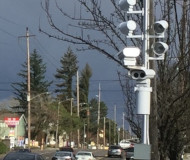1/3/2020
Special Interest Groups Push Repeal Of Federal Speed Camera Funding BanGroups that make money from speed cameras want Congress to repeal a ban on taxpayer subsidies for photo radar companies.

Federal grant funds may not be used to subsidize private, for-profit photo radar vendors under current law. A coalition of groups -- including several with a financial stake in the issue -- are pushing for a repeal of the congressional prohibition. The American Association of State Highway and Transportation Officials (AASHTO) and National Safety Council last month gathered a handful of special interest groups to petition US House and Senate Transportation Committee leaders to change the law to allow speed camera companies to receive taxpayer dollars.
"The undersigned organizations urge you to allow the use of federal funding to implement automated enforcement, if a state allows it, in work zones," the letter stated.
Since 2012, Congress has banned the use of what are known as Section 402 grants for speed cameras, as members of Congress from both sides of the political aisle have been skeptical about the motivations behind the use of automated ticketing machines.
Creating a new federal subsidy for photo radar would increase the cut of each automated ticket flowing into state coffers. AASHTO's membership consists of the state highway officials who would then be able to spend the profits generated by the highway speed cameras. The National Safety Council, which played a leading role in petitioning Congress, directly pockets money from speed camera ticket recipients who take council-approved "driver education" courses to avoid having their insurance premiums raised. In states like California and Arizona, photo tickets carry license points that can significantly increase insurance rates. The groups' letter suggests their only motivation is safety because photo radar will reduce accidents in work zones.
"Most work zone fatalities and injuries can be attributed to speeding," the letter claimed.
That claim, however, is at odds with federal figures that show the majority of fatalities among highway workers are not caused by "speeding" motorists, but by accidents involving the equipment used by highway workers (view statistics). Like Congress, eighteen states have considered and rejected the use of traffic cameras (view list of speed camera bans). In addition, 36 local jurisdictions have turned to the referendum process to outlaw photo ticketing in their communities (view list of public votes).


